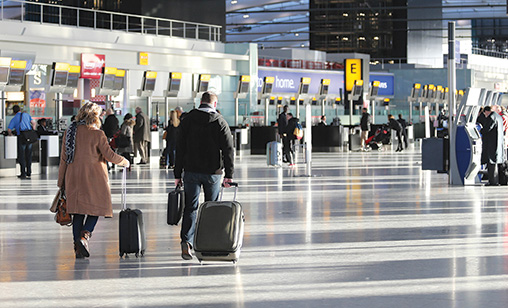Industry Insight Special Report
In the palm of your hand
July 1st 2019
Mobile technology has eaten voraciously into the business of travel bookings. Read More » For decades, the margins of Global Distribution Systems (GDSs) were fat, often averaging US$10-$12 per transaction. Now travel consumers are bypassing travel agencies, which is the major source of revenue for GDSs, to book directly with airlines or hotels after they have done their comparison shopping online.
The airline industry is being driven by shifts in consumer behavior, the quick evolution of technology and continued pressure to optimize revenue across all streams of operations.
 |
“Sabre has observed three trends the airline travel booking space is facing in the Asia-Pacific and the world, the company’s Travel Solutions Airline Sales vice president and general manager South Asia and Pacific, Rakesh Narayanan, told Orient Aviation.
“A growing emphasis on personalization means airlines have had to adapt their content creation (retailing) distribution and fulfillment,” he said.
In the Asia-Pacific, airlines are looking at comprehensive distribution models for New Distribution Capability (NDC) content, which means that the content available on their websites also will be accessible on the GDS providing a fair, non-discriminatory distribution model for travelers and travel agents.
Optimised loyalty management capabilities, with NDC’s evolution, mean personalized retailing will become the norm. Airlines want the ability to know all about their customers, regardless of the platform on which they make their bookings.
Having the technology to create comprehensive marketing programs that deliver unique experiences and that engage customers in new ways – from acquisition to loyalty – is becoming necessary for airlines.
Unlike traditional loyalty programs, the next generation of them will allow airlines to better market to consumers in the digital space regardless of the program on which they book, strengthening their ability to retain and attract customers while spurring new revenue by having richer portraits of those who travel with them, Narayanan said.
 |
Historically, GDSs would create offers by combining schedules, fares and inventory based on demand. Now GDSs will aggregate and distribute both NDC and non-NDC-enabled content seamlessly for travel agents to provide the best options for travelers.
Travelport vice president Asia-Pacific Air commerce, Chris Ramm said: “The biggest driver of change in recent years has been smartphones. Nowadays, smartphones are the most common medium used to make reservations for travelers. Travelport’s Global Digital Traveler Research 2018 found about half of travelers in the entire Asia-Pacific make flight and hotel reservations on mobile devices.”
Sixty one per cent of tourists download travel apps on their smartphones before their trips and 88% of tourists access information digitally while traveling, the study revealed.
With only the size of a palm for display, the priority for airlines and travel agents is to exhibit the necessary information in the most effective way, using AI technologies,” Ramm said.
Everything has changed from design layouts to data processing methods, which should continue to transform customers’ booking behaviors and preferences.
Mobile remains crucial, but travelers also want a consolidated experience across multiple platforms. On average, travelers use 10-12 apps for the research, booking and traveling for their trips. Not being able to access all information across all devices and platforms is regarded as a pain point by the majority.
 |
The Travelport study also revealed more than half of global travelers have used voice to search for information during booking or traveling.
But the region remains a segmented market for voice search. Sixty eight per cent of travelers in Indonesia have used voice search to research travel, but in Japan and Singapore the figures drop to less than 45%, which is below the global average.
The trend of increasingly using smartphones is more prevalent among millennials but the adequacy and availability of digital trip management can be a major point of frustration for them.
Compared with previous generations, millennials place greater emphasis on unique travel experiences than Generation X or other generations who are more concerned with tangible benefits. As a whole, close to 70% of tourists today share their travel experiences on social media and one out of five has said they are influenced by these travel postings.
In recent years, full-service carriers and low-cost carriers have been diversifying their distribution channels because airlines need to identify their customers. Operating in a highly regulated and competitive environment, airlines must embrace the mindset of retailers to cater to the changing behaviors of travelers.
Home to many LCCs and online travel agencies (OTAs), the Asia-Pacific is an interesting region to observe. In future, dynamic pricing will proceed by NDC and will enable full-service airlines to distribute additional fare price points, providing better opportunities to compete with LCCs and ultimately better serve their customers.
Today’s travelers are hungry for information compared with the past. With airlines offering more complicated fares and offers, customers are eager to understand what they are paying and why.
By mastering insights derived from Big Data, airlines and agents can enhance travelers’ experiences, encourage repeat trips and attract new customers with personalized offers and demand-led marketing, Travelport said.
Big Data allows companies to identify increases or decreases in advanced bookings to certain destinations as change is taking effect and provides opportunities to adjust their offers accordingly.
Hahn Air’s head of corporate strategy, industry and government affairs, Jorg Troester said: “What was unthinkable 30 years ago is standard procedure today with airlines selling unbundled services and generating a large amount of their revenue from sales of ancillary products. This trend is bound to continue.” Travel agents have access to the full suite of the offerings of airlines, way beyond the traditional GDS content and travelers have the freedom to shop directly for the most attractive, best priced deals. The NDC and the ONE order initiative will accelerate these trends by making airline content easily available to travel agents, meta search engines and new providers such as Blockchain-based channels. It is important for airlines to take heed of looming developments, Troester said. |